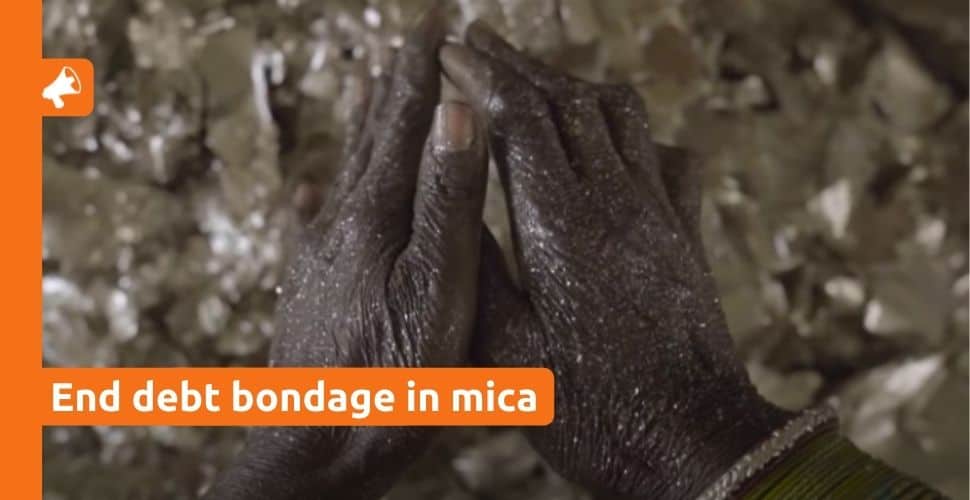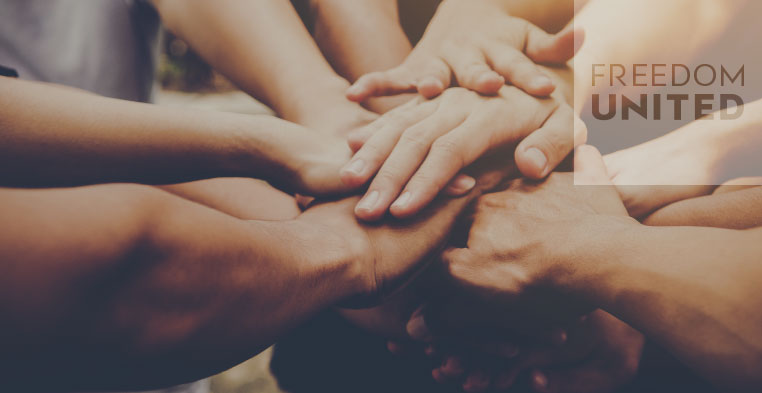Credit: Courtesy of CNA and The Moving Visuals Co.
Watch ‘The Ugly Side of Beauty’ here.
“Three years ago I got a loan from a money lender of 4,100 Indian rupees ($60) and til now I have been unable to repay. The interest is 10 percent monthly,” – Ramu Gazi, mica miner1
What is mica mining? And how is it related to modern slavery?
Take a look through your bathroom cabinet and chances are mica will be an ingredient present in some of your favorite products and cosmetics. A naturally mined mineral, mica is what gives make-up a sought-after shimmer in products like highlighters and eyeshadows. Even the automotive and electronics industries use mica to make our cars and phones gleam.
But many people whose livelihoods depend on small-scale mica mining, in places such as Jharkhand state in India – one of the world’s top mica producers – are trapped in cycles of poverty and bonded labor.
Often, entire families including young children will search for mica to mine and sell to local merchants that will then be sourced by multi-billion industries. This is dangerous work with a high risk of serious physical injury and even death. Workers will manually sift through sand to find scraps of mica and enter unstable mines that could collapse at any moment. Without any protective gear – not even proper footwear – inhaling dust from the mica mines causes long-term health issues and lung damage.
Barki Hazda, whose family has taken a total of 35,000 rupees ($490) in loans for food and a daughter’s marriage costs explained how the family works together, “I go along with my kids to work in the mines. The older boys and girls go down into the mines and bring the sand and dump to the surface, where I and my younger kids pick the mica.”2
With no other job opportunities available, the illegal mica mining industry is the last resort for thousands of families living in poverty. But mica mining barely provides enough food for mica mining communities. A worker explained, “Before we used to get 5 – 15 rupees (7 – 20 cents) per day for collecting 5 – 6kg of mica” but since the lockdowns as a result of COVID-19, work has been a lot slower.
COVID-19 has further exacerbated the already desperate situation for mica-dependent communities. A report in 2021 found that more people were being pushed into mining mica due to COVID-19 forcing other industries like hospitality to shut down while existing mica workers in the industry are finding their debts steadily increasing.3
Dulti Devi who earns no more than $1.50 on a good day mining mica said “I got a loan of 40,000 Indian rupees ($560) for my caesarean delivery four years ago. I haven’t paid back anything and interest has been accruing.”
Furthermore, various syndicates and gangs run the illegal mica mining industry, controlling who can access certain areas. Many workers resort to taking out loans from local loan sharks, including mica merchants, at exorbitant interest rates with little hope of ever repaying the debt. These unpaid debts are passed on to other family members, trapping generations and “entire villages” in debt bondage with no way out.4
Sangala Shoren, a mica miner, explained “My younger brother Dobrra (also a mica miner) died of tuberculosis recently. For hospital and medical costs, he got a loan of $350 from a money lender. Now it is my responsibility to pay this.”5
Mica mining – illegal, yet persistent
In the 1980s, Jharkhand state made mica mining illegal, pushing thousands into the margins of an economy dependent on mica with no alternative employment options. Mica-dependent communities, indigenous communities living in the state’s forests, and NGOs have been calling for a reversal of this policy that was enforced to prevent the deforestation of Jharkhand’s forests where mica is found, even though the kind of small-scale mining done by local communities has not been found to negatively impact the surrounding areas.
A video journalist speaking to Channel News Asia, Deepak Bara, said “People cannot work in agriculture in these areas [Jharkhand] because of poor irrigation, drought. Education is low. They have to turn to the business of mica just to support their families.”
The illegal mining of the mineral means that workers fear raids from forest authorities and some are forced to pay bribes to avoid being shut down.
What is being done against it?
International working groups designed to bring businesses together to take responsibility for improving conditions for mica miners have also been set up. The Responsible Mica Initiative is one of these efforts, started in 2016 as a multi-stakeholder initiative aimed at bringing together businesses to ensure responsible and sustainable mica sourcing from Jharkhand and Bihar state in their supply chain. Cosmetic companies like L’Oreal and Chanel joined the group which supports certain programs in villages with mica-dependent communities.
Ultimately however, despite these working groups and efforts from Jharkhand state to legalize the industry, progress in tackling the root causes of debt bondage has been slow and mica mining remains illegal. The desired outcome for mica-dependent communities – legalization of the mica industry and sustainable jobs – has yet to occur, despite the Department of Mines and Geology announcing plans for a new policy to legalize mica mining.6
Watch the video and sign the pledge to take a stand with mica miners – join the fight against debt bondage in mica mining.
Why not send a message to your favorite beauty brands and ask them how they’re investigating working conditions for mica miners in their supply chains?
Notes:



Make your voice heard
Comment
5
Share this petition